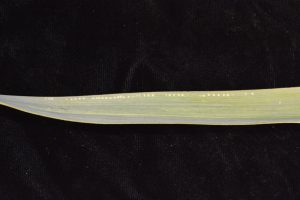A survey of fields from Princeton/Pennington in Mercer County northward through Milford and Asbury (Hunterdon County) and east to Chester in central Morris Co. revealed heavy allium leafminer feeding and active adults in chives only. There was only one garlic plant at the Pennington site that had feeding signs. Yellow sticky cards from chive plots in the Princeton area had numerous adults, but cards from a garlic field in Pennington did not have leafminers despite being within 200 yards of an infested chive plot.
At this point, allium leafminer adults appear to be favoring chives for feeding and egg laying. As one of the earliest and most succulent allium leaf types, chives may be a good indicator of the onset of adult activity, and could be useful as we decide when to begin protecting our other allium crops, including overwintered leeks, garlic and onion plants now being transplanted. Because egg laying is now happening, the prudent course of action would be to protect these crops, either with row covers or with recommended insecticides. These include Trigard, Scorpion, Radiant and Entrust (OMRI-approved). For a complete list see the RCE Vegetable Crops Online Resource Center Critical Updates to the Mid-Atlantic Commercial Vegetable Recommendations.
If you wish to inspect crops in your area, start with chives. Observe the tallest leaves first, and look for lines of characteristic white spots. These are wounds made by the female as she pierces the leaves to lay eggs and extract plant sap on which to feed (see photo below).
As a review, allium leafminer has spread from Pennsylvania into New Jersey, New York, and Maryland. At present, the main area of infestation in New Jersey appears to be in the northern counties. Only one suspected fly has been caught (Fall, 2016) in southern New Jersey in East Vineland. Traps set in this southern area will be checked this week. The Vegetable IPM Program will continue to track the spread and population levels of ALM in New Jersey.


